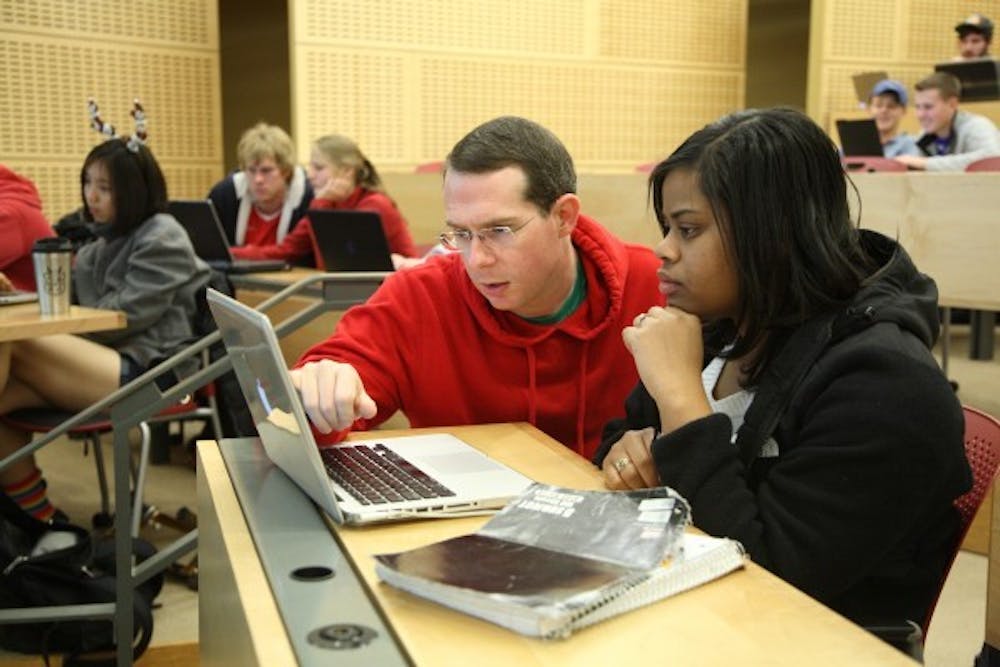Associate Prof. Mark Sherriff in the Computer Science Engineering Department was recently awarded the IEEE Computer Society’s 2016 Computer Science Undergraduate Teaching Award. Sherriff will be recognized in June in Atlanta for his contributions to the field through innovating, teaching and committing increasing diversity in computer science programs.
Sherriff, who earned the University All-University Teaching award in 2014, said while that award recognized him as an important part of the University community, the IEEE award recognizes him amongst peers in his field across schools.
“One is the community and scholars you work with everyday and the other is the community of people that do the same thing that you do,” Sherriff said. “I was honored just to be nominated and the fact that my colleagues saw it fit to give me … was just really cool.”
In the introductory programming course, Sherriff uses innovative teaching methods like the “encryption chase,” in which students are instructed to encrypt the lecture utilizing class concepts only to be sent on a scavenger hunt across Grounds to decode the lesson plan.
“The first time I do it, and they encrypt something that says ‘pack up your bags and leave the classroom,’ the look on people’s faces is priceless,” Sheriff said. “I like finding new ways for the class to operate. I like breaking people’s expectations for what happens when they come to class.”
Sherriff said his emphasis on creating experiences — like performing skits in class — lends itself to students’ learning.
“I think that people learn best when they can hear the material, see it in action and have a little bit of fun doing it,” Sherriff said.
Dean of the Engineering School Craig Benson commended Sherriff’s ability to create engaging and informative experiences for students.
“Professor Sherriff is a leader in the kind of hands-on, minds-on learning experiences we intend to provide for all of our student at U.Va. Engineering,” Benson said in a press release. “This award is well-deserved.”
Sherriff seeks to create experiences that speak to his students’ diverse academic interests, a skill which is particularly important for his introductory-programming course, which is open to students from many different schools.
“It’s important to cover information to teach the class, but it’s also important to know who’s in the class so that you can use examples to reach everyone the best you can,” Sherriff said. “Just a few weeks ago we were talking about regular expressions and how you find patterns in text. I downloaded Alice and Wonderland, and we were wondering if you could figure out who the main character was by how many times their name appears in the text, and that’s something liberal arts majors very well care about — that’s applicable to what they’re interested in.”
In terms of gauging feedback to improve his courses, Sherriff underscored the importance of his teaching assistants, most of whom are former students.
“The people that keep [me] honest are my TAs, and it is my policy to hire students that have taken my class to come back the next semester and TA the class,” Sheriff said. “Those are the ones that say ‘you screwed up the key’ [or] ‘when you do this assignment next time, could you do it this way?’ They’re invaluable.”
Second-year Engineering student Joseph Ghiorzi, who has taken one of Sheriff's classes, spoke to how Sherriff cares for his students not only as learners but also as people.
“Professor Sherriff is a fantastic professor. It is evident that he cares about his students, despite teaching a large intro class,” Ghiorzi said. “He is immensely knowledgeable about computer science, but more importantly he is an incredibly understanding professor who knows how to effectively convey the concepts that need to be taught in an easy-to-digest manner.”
Moving forward, Sherriff hopes to do more with gamification in classes, which includes taking game elements and applying them to his courses. For example, in his game design classes, he implemented a tool for students to earn “experience points” instead of grades.
“One of the ideas behind that is when you go to take a test, you’re probably thinking, ‘I don’t want to screw up. I don’t want to lose points,’” Sherriff said. “It’s a positive experience, or positive mentality as opposed to a negative mentality. [It’s a mindset of] ‘I don’t want to be punished’ versus ‘I want to show I know what I am doing.’”
From his vast experience in the field of computer science, Sherriff hopes to clarify some of the misconceptions about careers in his field.
“It’s not about the hacker sitting in his basement with Doritos and Mountain Dew trying to hack the NSA. That’s not the program,” Sherriff said. “Computer software engineering as a discipline is very human-focused, it’s very customer-focused and it’s very interactive. You’re meeting with people, learning what their needs are and trying to come up with solutions to help them do their own jobs better.”
Correction: This article previously said Joseph Ghiorzi served as a teaching assistant for Sheriff.







